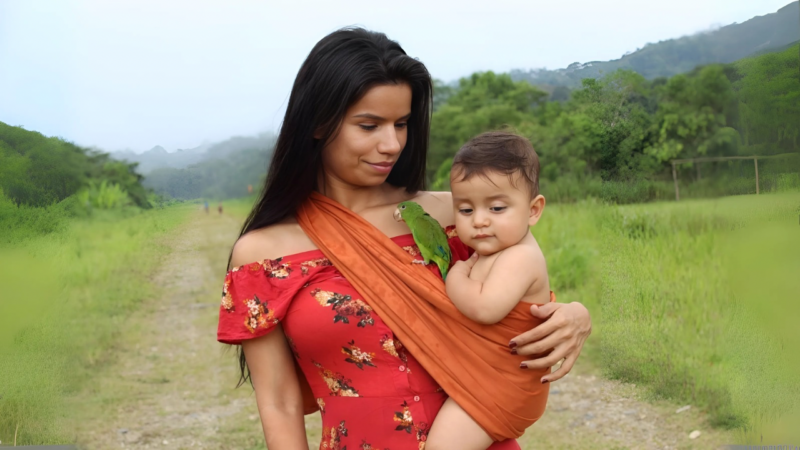
By 2024 Pritzker Award finalist Nina Gualinga
My path was forged long before I was born. I am an extension of my mother and all my foremothers — of my community and the land that shaped me.
My first memories are not images, they are feelings. The feeling of fresh soil between my toes, the smell of the humid forest, the sound of thunderstorms and the warmth of my mother’s body holding me. As a child, I ran barefoot around the beaches of the Bobonaza River, chasing butterflies far away from the overwhelming sounds of the city. Every morning my family woke me up at four in the morning to gather around the fire to share stories and dreams. I listened carefully as my grandparents spoke about the forest and all of the beings that are a part of her. I learned early on that the mountains, trees, jaguars, rivers, rocks, and even the smallest insects were all alive and interconnected with one another. Thunderstorms would flood the creeks and give strength to the currents. We would throw ourselves into the water over and over again, letting the creek carry us together through the jungle. Only when the crickets began singing and the sun began to set would we know it was time to go home.
The beginning of my story is marked by a profound sense of freedom and connection to the land. It was easy to believe as a young child that this was life, that it would never be taken away from us. But it was not long into my childhood when I realized that the freedom of my people, our way of life and culture were being threatened by groups from outside of the forest.
I will never forget my first feelings of heartbreak. It was the day I thought I was going to lose everything, the day that changed my life forever. When I was eight years old, my people gathered for a meeting in Sarayaku’s community house. Inside the meeting stood a pale and bald man who presented himself as Ricardo Nicolas, a representative of the Argentine oil company CGC. He referred to our territory as block 23. “What block 23?” I asked myself. “This is not block 23, this is our home.” I was a child, but I knew very well that oil exploitation in Saryaku would be a cultural and spiritual death sentence for us as a people.
The women of my community were angry, speaking loudly in our language, Runashimi. They told Ricardo to go back to Argentina and leave us and the rainforest in peace. They told him we would never sell our lands to the oil companies, that the forest was not for sale and could not be bought.
“What will happen to my family, to my friends, to the river, to everything I love and call home?” I asked myself while watching Ricardo carefully. I was in rage, the kind of anger only a little girl who is about to have her future taken away can feel. With tears running down my cheeks, I ran away and found safety in between the trees and sat down. It was in that very moment I made the promise to fight back, to protect this place myself and so many call home. I had no idea how, I just knew I had to do something, no matter how insignificant that may be.
My people knew that we had no choice but to fight back, and that is exactly what we did. From the first moments when the company arrived in our territory until the present day, the People of Sarayaku have not backed down to the threats coming from the oil industry.
I have seen my people collectively organize and struggle for over two decades now, and we have achieved major victories. For example, in 2012 our community won a historic case in front of the Inter-American Court on Human Rights, which held the Ecuadorian government responsible for violating our collective rights.
However, this does not mean that the threats are gone. In fact, the world’s demand for fossil fuels and minerals is larger than ever, and indigenous territories are being concessioned to big oil and mining companies at a rapid rate. I see the systemic attack on land and Indigenous Peoples around the world, which is why my life’s mission and work has expanded into gender justice, climate justice, because they are intertwined. I continue to find strength in the knowledge that our ancestors took care of these lands for us to be here today. I find inspiration in the laughter of the children, in other indigenous women and leaders around me, those who continue to safeguard stories and ancestral knowledge in their everyday lives.
I don’t know if I have recovered from that first heartbreak or if I ever will. But I will not give up until our lands and our people are free. Ultimately, it comes down to that one moment 23 years ago when I made a promise as a little girl to the soil, to the rivers, to the trees and to my people, to my unborn children and to yours.
